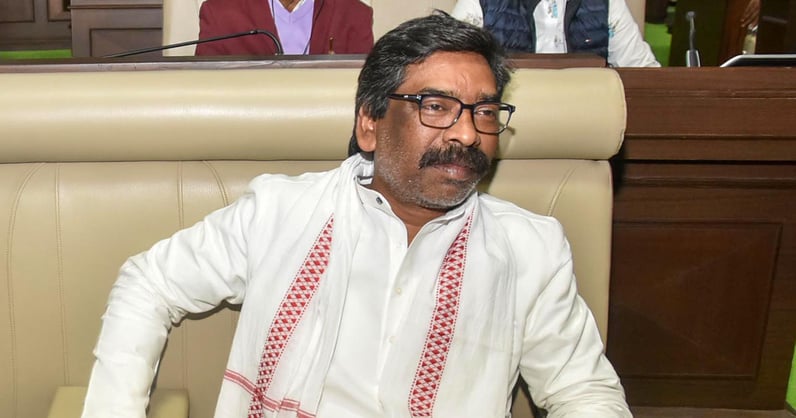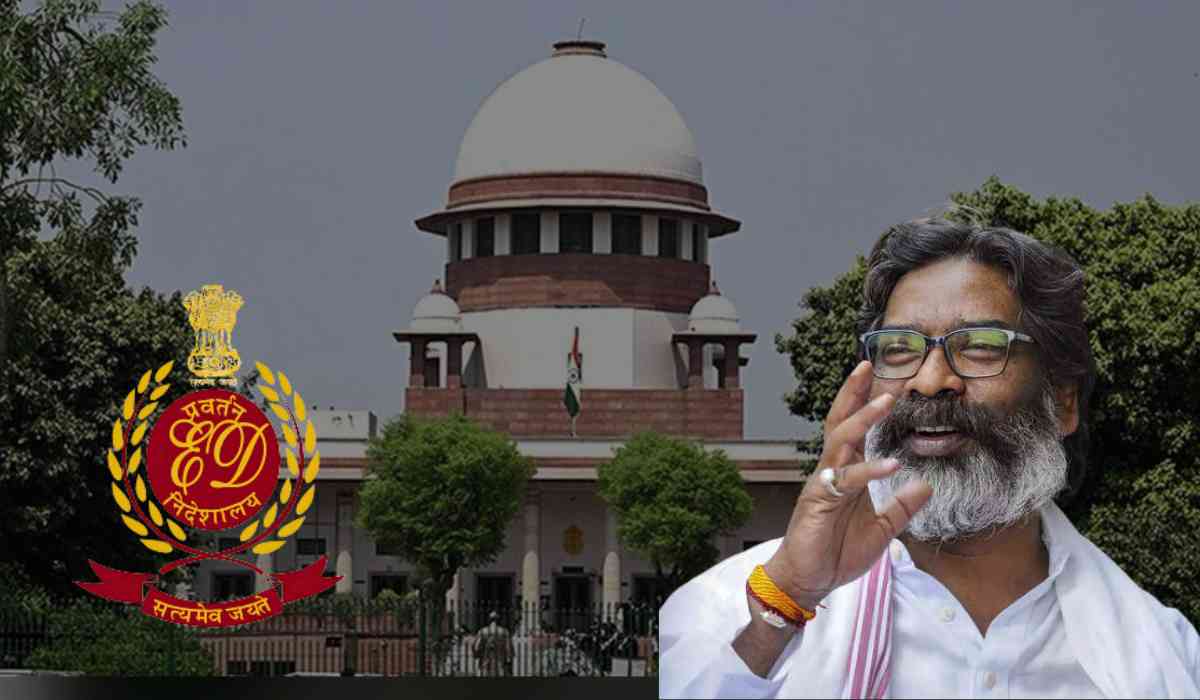The Supreme Court scrutinised the sequence of legal actions and responses by Soren's legal team, led by senior advocate Kapil Sibal.
The Supreme Court is currently in a complex legal debate over the arrest of former Chief Minister of Jaharkhand, Hemant Soren, in a land dispute case. Lawyer Sibal and Additional Solicitor General Raju presented arguments challenging the arrest's legality under the Prevention of Money Laundering Act. Justice Datta emphasised the need for a rigorous examination of whether an arrest can be deemed invalid after trial court cognizance. Sibal argued the arrest was illegitimate, citing the Enforcement Directorate's lack of substantial evidence. Justice Datta probed the trial court's findings, questioning the link between evidence and the accused. Sibal highlighted the civil nature of the land dispute and suggested interim relief.
for more on this, read; SC Concludes Hearing In Hemant Soren Case, Sets Hearing Date For May 22nd
The case was set for further deliberation on May 22, 2024.

Background
- Case Context: Former Jharkhand Chief Minister Hemant Soren challenged his arrest by the Enforcement Directorate (ED) in a money laundering case linked to an alleged land scam in Jharkhand.
- Initial Arrest: Soren was arrested on January 31, 2024, following his resignation as CM. He denied the allegations, claiming a conspiracy.
- Legal Proceedings: His plea against the arrest was dismissed by the Jharkhand High Court on May 3, 2024. The Supreme Court (SC) issued notice to the ED regarding Soren's challenge to this decision on May 13, 2024.
For more, read: CM Hemant Soren Chairs Meeting Amidst ED Probe, Denounces Summons As Abuse Of Legal Power
- SC: "When did you get to know about the cognizance taking order of April 4?" , questioned Justice Dipankar Datta.
- Sibal: "I was in custody then, I must have known."
- SC: "4th itself then?"
- Sibal: "Yes, it may be assumed."
- SC: "Why did not you tell us that the bail plea before the special court was pending by April 15 when you applied for bail?"
- Sibal: "I should have told release, but I said bail."
•→ Sibal's response suggests that there might have been a misunderstanding or oversight in communication regarding the specific legal proceedings and terminology used in the application for release. While he acknowledges the court's inquiry, he clarifies that there was no intentional omission but rather a technicality in the language used in the application. This exchange underscores the importance of clear and precise communication in legal proceedings and highlights the need for transparency between counsel and the court.
- SC: "We expected some candour from your client. This conduct leaves a lot to be desired... This is not how you come before the court without disclosing material facts."
- Sibal: "Then it is my personal fault and not my client's. Our intention is not to mislead the court."
- SC: "We do not approach writ petitions when we know another forum has been approached already."
- Sibal: "I am in enough difficulty; let me answer."
- SC: "We think the person in custody is not acting with bona fide."
- Sibal: "But he is in custody and he is not in touch with us. It is not his fault at all."
•→ This exchange highlights the court's expectation of transparency and honesty from parties appearing before it, as well as its concern when multiple forums are approached simultaneously. Sibal's response reflects his commitment to addressing the court's concerns while also defending his client's actions in light of their circumstances, particularly being in custody.
- SC: "Dismissed as withdrawn. It is very difficult for us to regulate the business of the high courts."
- Sibal: "I will withdraw. I did not think this will come in my way, milord."
•→ This exchange signifies the conclusion of the case in the Supreme Court, with the petitioner (represented by Sibal) deciding to withdraw the case. The court's explanation reflects its reluctance to intervene in matters that primarily fall under the jurisdiction of the high courts. Sibal's response indicates his acceptance of the court's decision, despite any unforeseen challenges it may present to his legal strategy
- Justice Dipankar Datta emphasised the court's dedication and criticised those who undermined the judiciary's efforts.
''Very unfortunately Mr Sibal despite efforts being put by judges it is said that judges work for very few hours. Those who say all this are part of governance, in one matter filed by union etc is filed within limitation. every case has a condonation of delay application. all who castigate judiciary must take note of this. we burn the midnight oil even during the vacations.''
- SG Tushar Mehta affirmed the high workload and dedication of the court.
SG Tushar Mehta: the only court in the world which works this much
•→ These additional remarks reflect the acknowledgment of the court's efforts and the challenges it faces in fulfilling its responsibilities, underscoring the importance of respecting and supporting the judiciary in its pursuit of justice.
Legal Implications
This case highlights the Supreme Court's stringent expectations for transparency and honesty from litigants. The court's emphasis on full disclosure underlines the judiciary's commitment to integrity and fairness, setting a precedent for future cases.
Next Steps
Following the dismissal, Soren's legal team may explore other legal remedies or appeals. The focus will likely shift to addressing the court's concerns about transparency and ensuring that all future filings are meticulously detailed.
Broader Impact
This case is a significant episode in India's ongoing struggle against political corruption. It underscores the judiciary's proactive stance in scrutinising high-profile cases and ensuring that legal processes are not misused for political gains.
Input from Multiple agencies
Media Credits: X
ⒸCopyright 2024. All Rights Reserved Powered by Vygr Media.






















